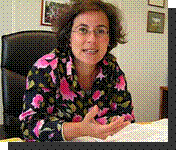 Mark Gerzon in his book on leadership and conflict tells this compelling story:
Mark Gerzon in his book on leadership and conflict tells this compelling story:You are an Arab official for the United Nations assigned, despite your resistance, to Baghdad. You play a key role in the reconstruction of Iraq following the U.S.-led war. You don't want to go, but you accept the assignment with reluctance. You have been there only a few months when one day, without warning, the building in which you are headquartered explodes. Twenty-two of your colleagues are killed. You barely survive. You learn that the cause was a car bomb, detonated by terrorists.
Under these circumstances, can you develop, and maintain, an integral vision?
Nada al-Nashif, an Arab woman, was serving as country director for the United Nations Development Program (UNDP) when, on August 19, 2003, a bomb exploded just outside the UN offices in Baghdad. At that moment, she was meeting with Sergio de Mello, the UN's special envoy to Iraq, who had been assigned by the UN secretary-general the impossible task of rebuilding a divided and devastated nation. Suddenly and without warning, recalls Nada, the building "was violently ripped apart."
"It seemed, for split seconds, that time had stopped," Nada recalled a year later. "I recall mounds of dust, muffled noises in the background, and a sharp, incessant clanging in my ears (a burst eardrum, I later understood). We were enveloped in debris and rubble around where our conference table had stood ... in the hazy outline of the demolished room, I could make out the shapes of my male colleagues, their white or blue shirts shredded by glass and soaked in blood."
Brazilian diplomat Sergio de Mello, one of the unheralded heroes of our time was dead. So were twenty–one other UN officials. Severely wounded by shrapnel that tore through her face and hands, Nada was rushed to surgery in a U.S. Army hospital, then evacuated to Amman, Jordan, for more surgery, and finally, after months of convalescence, returned to a desk at UNUP headquarters in New York.
Sitting with her there, I am astonished at her continued dedication, determination, and hope. I listen to her voice, listening for anger and bitterness and blame. But all I can find is dedication: to bring peace and prosperity to the Arab world, to stand up for self-determination of all peoples, to fight hypocrisy and lies of all kinds, and to work for the people of her region without being sidetracked by the perpetrators of violence on both sides.
"I am sure now that there was a certain innocence—the belief that the big blue flag was our protection, its folds sufficiently strong to make us untouchable," she said a year after her encounter with death. But despite her loss of innocence, she continued to hold fast to her vision. She had not wanted to go, because she saw what a "ludicrous proposition" it was for the UN to become associated with this "liberation of such devastating proportions, this proxy government, and these brazen occupiers."
"As an Arab UN official," she said, stressing the word, "I was torn by competing impulses—on the one hand, what could be more infuriating than having to work with the coalition forces, support their violence-based administration with minimal room for maneuver and little hope of genuine sovereignty. On the other hand, we were in the midst of a remarkable moment in history-perhaps a truly unique opportunity to make a contribution to this rebirth, to exert an influence, however marginal, in the direction of an independent state, however inauspicious its birth."'
Nada was "torn by competing impulses" because she was, to the best of her extraordinary ability, holding the whole. Almost killed by anti-American terrorists and outraged by the imperial arrogance of the American government, she did not have the luxury of idealizing Osama bin Laden or George W. Bush. As a key architect of the UN's strategy to rebuild the ravaged nation, she had committed herself to identifying with all the constituencies. She could understand the Iraqi rage at the Western occupiers, and she could sense the powerful opportunity to give birth to democracy. In her body, in her soul, these and other conflicting perspectives resided uneasily, held together only by the remarkable strength and deep compassion of her integral vision.
Mark Gerzon, Leading Through Conflict: How Successful Leaders Transform Differences into Opportunities, Boston: Harvard Business School Press, 62-63.
Image: Nada al-Nashif